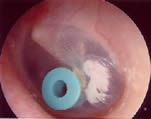
On the site introduction what is it? main symptoms more symptoms diagnosis treatment self help my story my diary driving A-Z disability hereditary burn out salt Prosper Meniere famous people staying positive stress feedback search |
Treatment (medical treatments not holistic)Diet & stressVestibular rehabilitation Medication Surgery Bilateral treatment For many people the vertigo in Meniere's can be managed by changes in diet, lifestyle and when necessary, with medicine. Reductions in salt, caffeine, alcohol, nicotine and stress may be all that is needed to dramatically reduce the volume and intensity of attacks and symptoms. For most the number one priority is managing the vertigo and as such treatments tend to focus on this. The inner ear endolymph fluids contain virtually no sodium. Controlling salt in your diet should assist regulation of this, preventing swelling (hydrops) in the inner ear and subsequent attacks. Many doctors will prescribe a diuretic to assists the reduction of fluid retention. Many sufferers report that stress can exacerbate symptoms or even trigger vertigo attacks. It is known that many changes occur in the body when experiencing stress, which no doubt can influence all parts of the body including the inner ear. For some, medication may also be required to control or reduce vertigo. Some commonly prescribed medications in the UK are listed below. Serc Click here for a comprehensive list of medicines used in USA. Vestibular retraining / rehabilitation.A vestibular retraining program may benefit those with ongoing dizziness. Cawthorne Cooksey exercises for example, are aimed at rehabilitating the balance system. Relaxation exercises may also assist patients with stress and there is good success in response to tinnitus. These exercises will not control vertigo. Surgery - grommet / t-tubes / Pressure equalisation (PE) tubes
Meniett DeviceThis device works with similar principals to the above. A small ear piece placed in the ear, then a small portable device will send a pressure wave through a grommet. Click here for further information. Endolymphatic Sac Surgery / ShuntThe endolymphatic sac is located below the balance organ. This operation decompresses and opens the endolymphatic sac opening. The theory is that the sac duct may have become blocked, but once widened, can then absorb some of the endolymphatic fluid again. Occasionally a small shunt is placed to open the duct between the sac and the balance organ to allow endolymph to drain. Success in controlling vertigo is thought to be around 70-85% and the risk to hearing caused by the procedure is minimal, however their is the potential for blockages to reoccur. Some of the latest research suggests that it is better to remove the visible portion of the sac altogether. This operation can be performed in bilateral Meniere's. GentamicinGentamicin is an antibiotic which is toxic to the cells in the inner ear, thus injecting into the inner ear will stop their functionality. In time, the healthy ear should do its best to compensate for loss of the affected ear, restoring balance. Injections are usually given in low doses on a weekly basis until success. Risk to hearing being affected by the treatment is 10% and can only be used in unilateral Meniere's (only one ear affected). more info LabyrinthectomySurgical labryinthectomy is used to treat Meniere's far less than the above. The operation will completely destroy the balance organ on the affected side and hearing is completely lost which is why this operation is usually only considered where hearing loss is already significant. In time, the healthy ear should do its best to compensate for loss of the affected ear restoring balance. This can only be used in unilateral Meniere's (only one ear affected). Vestibular Nerve SectionThe vestibular nerve carries the balance signals from the inner ear, to the brain. This operation cuts the nerve, therefore the signals do not reach the brain. The inner ear continues to function thus hearing will continue to be lost as the disease progresses. In time, the healthy ear should do its best to compensate for loss of the affected ear restoring balance. This can only be used in unilateral Meniere's (only one ear affected). Bilateral Meniere's.Treatment for those with bilateral Meniere's is a challenge to the medical profession, especially when the above treatments have already been carried out. Research shows that Meniere's affected ears still have some small balance function even in later stages of the disease so destroying these early on could be problematic if bilateral Meniere's is later diagnosed. Endolymphatic sac surgery can be considered and Intratympanic steroid injections to reduce inflammation are possible. This web site has been written and developed by Alex Tye - "MrLexy" on the internet!
|
||
